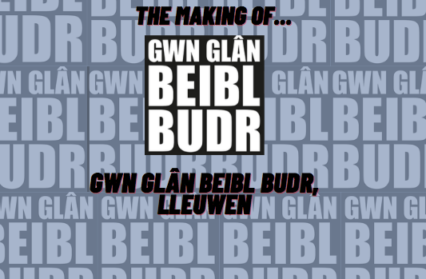What goes into the making of a great album? From the creative throes of songwriting to the sometimes-spontaneous, sometimes-arduous process of recording a full album, Wales Arts Review dives into the making of some of some iconic albums from Welsh music artists in our new series ‘The Making Of… ’. This week, we take a look at Gwn Glân Beibl Budr by Lleuwen.
A record of raw and eclectic influences, Gwn Glân Beibl Budr has been praised for its impressive list of collaborating musicians and its notably avant garde, emotionally poignant sound. Recorded with a live band, Lleuwen’s approach was key to conjuring the atmosphere felt throughout this album.
Lleuwen’s record came in at number 52 in Wales Arts Review‘s 100 Greatest Welsh Albums of all Time list, praised for a “sound [which] transcends a specific genre and is a uniquely Welsh mix of roots, folk, religion and raw emotion. A classic statement from the second decade of this century”. So what was it like producing such texture and spontaneity in the studio? We hear from Lleuwen on the making of Gwn Glân Beibl Budr.
I wanted a live sound, so we used Sain Studios in Llandwrog – a great space for live recordings with a band. It was mostly recorded live with very little separation between musicians. My previous album, Tân, was recorded as a duo with Vincent Guerin in a small studio and we played around with electronic stuff and lush over dubbed backing vocal layers etc. Here, I wanted a change, to swing the other way and do something different for Gwn Glan Beibl Budr. So, this time, no backing vocals. I got a band instead. There is a certain magic about live band recordings. They don’t just capture the music, but the atmosphere, too. To me, Gwn Glan Beibl Budr is all atmosphere.
The real challenge we had was getting it to be as “live” as possible. Technically, Aled Wyn Hughes the producer did a wonderful job with this. The triple harp and drums were on opposite sonic spectrums and yet the drummer, Dafydd Hughes, and harpist, Llio Rhydderch, wanted to sit as close to each other as possible. I don’t know how Aled managed to make this work, but he did. We had no option other than to go totally live with everything.
I had already written the songs years before recording them. I had been gigging a few of them as a solo artist, too, so I knew which songs worked and what tempo worked best for most of them. I got that information just by the reaction of the audiences I interacted with.
I knew it was time to record when I worked with Aled Wyn Hughes (producer) on a stage production for the Eisteddfod in the summer of 2017. I think we were on the same wavelength for a good few months after that show somehow. It’s all about the timing, and I just knew that the time was right and that I wanted him to produce this album with me.
It was recorded in October 2017, but I didn’t release it until November 2018. I had some health issues that I needed to deal with so I waited for the time to be right. I needed space to get myself together, and, you know, it was totally the right thing to do. Again, I trust the timing of things. When you know you just know.
I have so many wonderful memories from the studio. I wanted the record to be free and wild, but I didn’t want it sounding anything like what could be categorised as “jazz”. It’s actually really hard to make improvisation not sound like anything but jazz! But Francesca Simmons did it in her violin solo on ‘Cân Taid’ and, even today, it still makes me beam. It just sounds like nothing else – I’m so in awe of her. Plus, witnessing Llio Rhydderch and Dafydd Hughes’s mutual appreciation was as fun as it goes. They are very similar in their approach to music, they just let go completely.
Good times bring good work. This I know. I cooked a lot and filled Sain studios with Breton food and drink – the smells of pancakes and cider were always present. Although the record is full of heavy themes, we were having fun and that’s always so important to me. You can hear it, I think. This kind of playfulness throughout.
Witnessing the musical appreciation between musicians is what I remember most about the sessions. I think we were all slightly out of our comfort zones, and that’s a good place to be. I chose the musicians carefully as I wanted people who are lovers of letting go.
I remember when singer Rhys Meirion arrived at the studio… he was slightly nervous and was randomly singing a Welsh hymn to himself. It was so soulful it broke my heart. I asked him to try and sing that very verse at the end of the song ‘Cofia Fi’. It fits! And it stayed on the record. Each time I hear this magic moment I melt. Honestly, I wouldn’t change a single note, lyric or beat.












